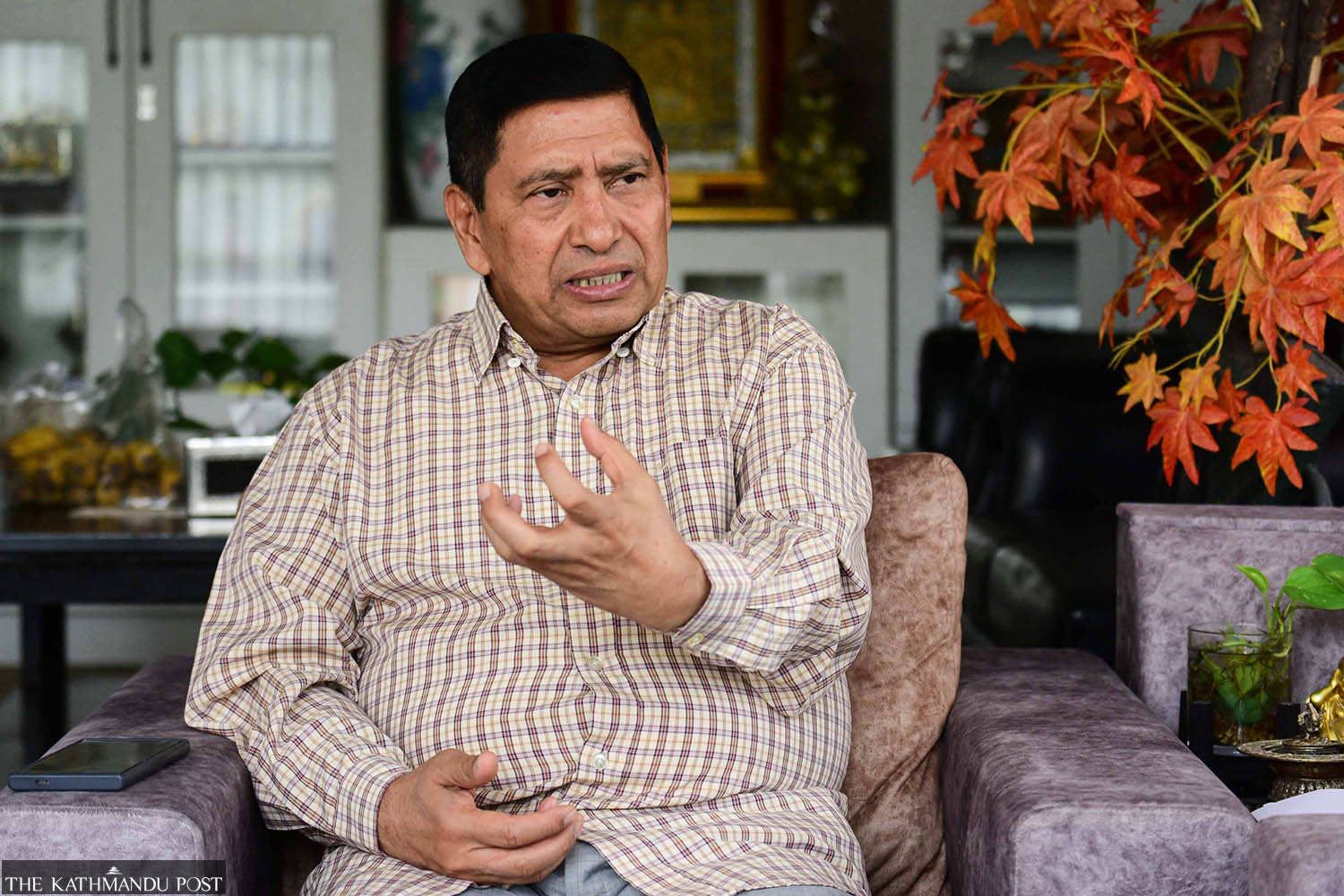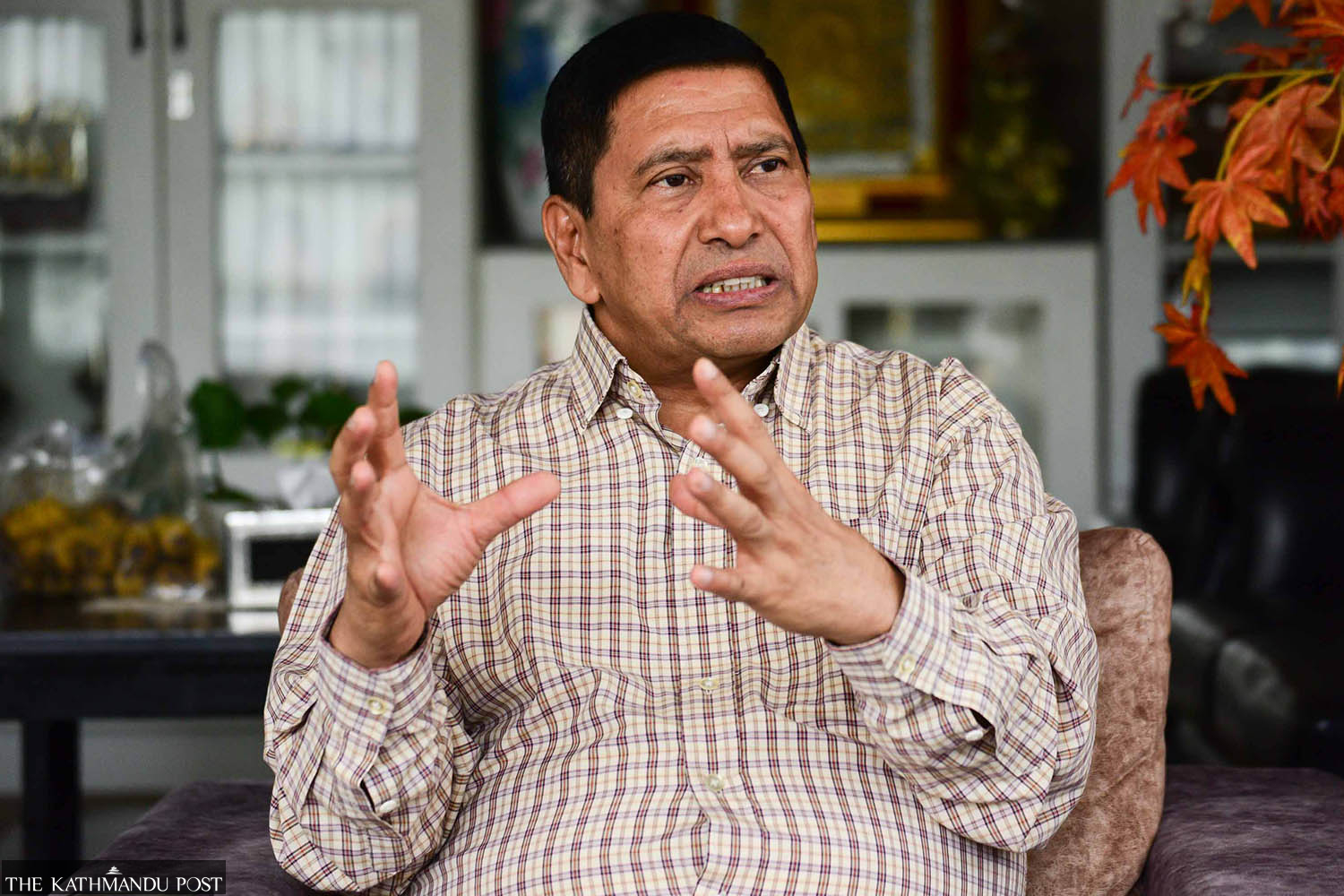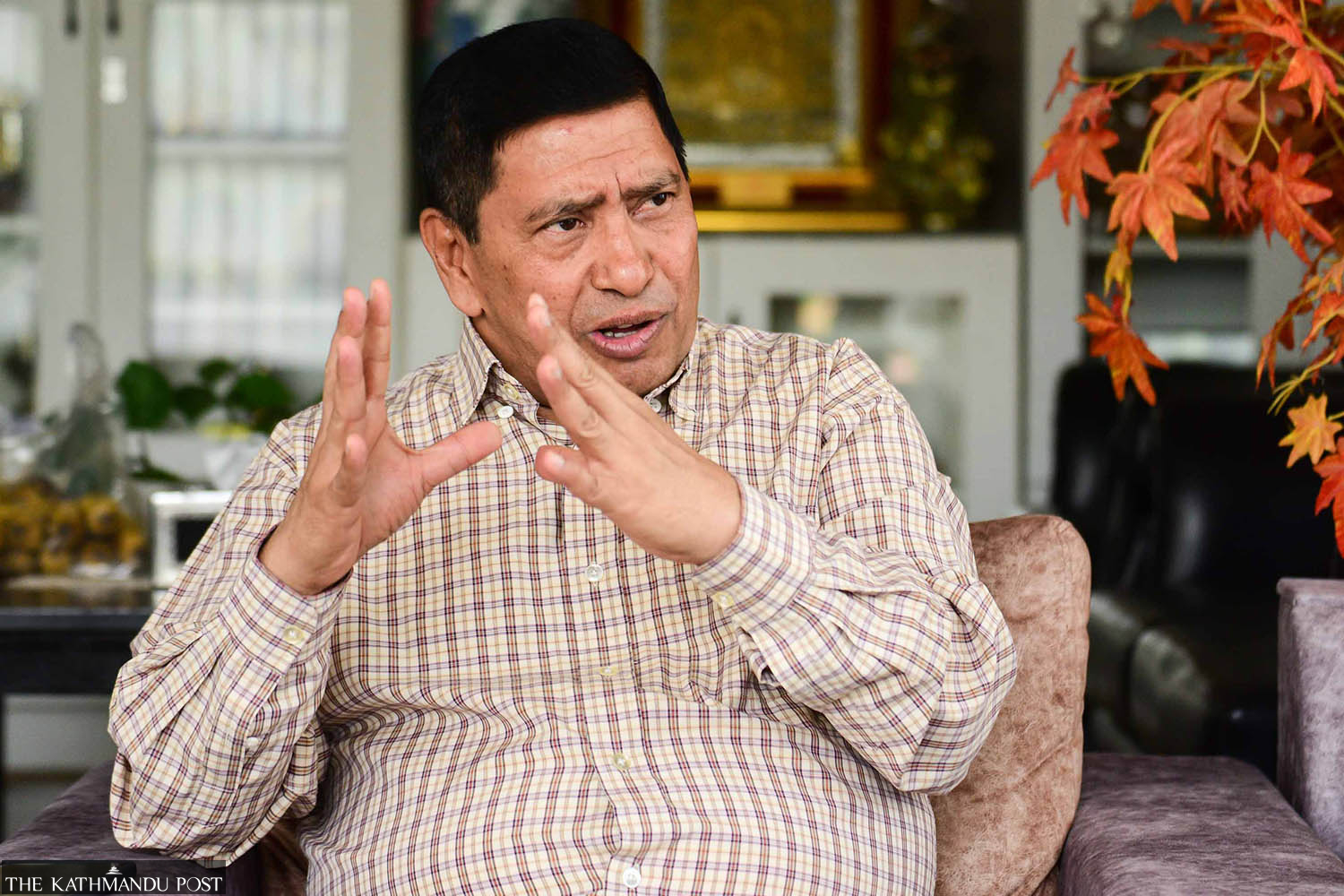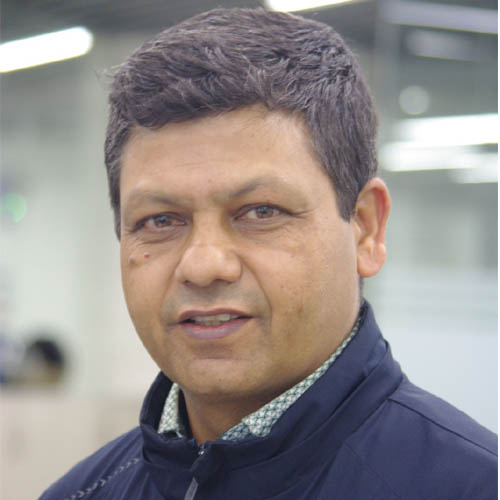Interviews
Being a politician does not shield anyone from investigation
There is no reliable basis to forge a long-term strategic collaboration with the Rastriya Swatantra Party.
Thira Lal Bhusal
During his term as home minister in the previous Pushpa Kamal Dahal-led government that was toppled in mid-July, Narayan Kaji Shrestha, who is also senior vice-chair of the CPN (Maoist Centre), undertook some bold actions. He swung into action on high profile corruption cases such as Bhutanese refugee scam, Lalita Niwas land grab and cross-border gold smuggling. The Post’s Thira Lal Bhusal met him on Sunday to ask him of the performance of the new government, the saga around the arrest of Rastriya Swatantra Party chair Rabi Lamichhane.
CPN (Maoist Centre) chair Pushpa Kamal Dahal, as leader of the main opposition party, convened a joint meeting of opposition parties on Friday. It seems the opposition parties want to solidify their unity against the ruling coalition. What will be the opposition camp’s strategy to build pressure on the government?
The government has not been effective in relief distribution, rehabilitation and reconstruction in the areas ravaged by the devastating floods and landslides in the last week of September. Therefore, we convened the meeting to draw the government’s attention to this sorry state of affairs. Second, right since the formation of this government [in mid-July], we suspected this coalition would play a negative role in terms of controlling corruption as the present coalition partners joined hands after being scared of the anti-corruption movement launched by our government [led by Pushpa Kamal Dahal]. It has become imperative to stop the government from doing wrong things and alert the people. Third, there are suspicions that the government is preparing to make it easier for dissident groups in various parties to split political parties by amending the Political Parties Act-2017 through an ordinance. Thus, we basically wanted to press the government to effectively carry out the post-disaster rehabilitation works and stop it from various wrongdoings.
Are there specific issues on which the opposition camp wants to build pressure?
Effective work on rehabilitation and reconstruction in the disaster-hit areas is our immediate demand. In the long-run, we want to raise the agenda of good governance because developing Nepal as a prosperous country and ensuring social justice should be our central mission. But this isn’t possible without first curbing rampant corruption. Unfortunately, the government is taking a negative approach in this connection.
Could you give more specific details where the government went wrong in terms of corruption?
To take the latest example, the CPN-UML, which is headed by Prime Minister KP Sharma Oli, recently accepted a donation of land worth tens of millions of rupees from Min Bahadur Gurung, owner of the country’s largest retail chain, Bhatbhateni Supermarket. The business tycoon has also announced plans to make a building for the party. During our tenure, the government filed a corruption case against him in Lalita Niwas land scam. He was arrested and later the Special Court convicted him of corruption. The land has already been retained as government property. Later, he moved the Supreme Court, where the case is sub judice. Prime Minister Oli had earlier vented his ire for arresting and filing a case against Gurung. We had suspected that he had done something wrong in collusion with Gurung. Oli’s acceptance of the property in the name of donation is unacceptable on political and moral grounds. It is against the good governance drive we launched. You know, we had initiated action in various major corruption scams during our tenure. There are reports that the government is trying to give clean chit to the accused instead of taking the process ahead. Thus the present coalition is working against good governance.
In the meeting of the opposition coalition on Friday, Rastriya Swatantra Party chair Rabi Lamichhane, who was arrested on Saturday, sought support of other opposition parties [based on the information that he was being arrested] arguing that action against him was politically motivated. Will the opposition parties support him?
Any case should be independently and fairly investigated. No culprit should be spared. At the same time, no political bias should reflect in the investigation. We can’t say anything about the government agencies’ investigation process. The meeting stressed on the same. It was during my tenure as home minister that the government initiated the investigation against Lamichhane after a supplementary case was registered at the Kaski District Police Office, accusing him of misusing deposits from a Kaski-based cooperative. Later, the parliament formed a special probe committee to investigate. Now the home ministry has taken action against him based on the recommendation of the same panel. We have to cooperate with the government in its investigation. The only thing we can say is that the investigation should be fair and independent. No political party can stand against the investigation itself.

How do you see the protests by the RSP cadres following his arrest?
They can raise their voice against the possibility of political revenge in the case and demand fair investigation. But they have to cooperate in the investigation and accept the findings. No one can obstruct the investigation just because someone is a politician. The government agencies can’t enforce rule of law if all political parties start protesting against investigations on individuals affiliated to them. A few of the RSP’s concerns are valid too. They argue that the government is working in a discriminatory way. For instance, there are reports with evidence showing involvement of some Nepali Congress and CPN-UML leaders in various cooperatives’ scams. They have asked why the government is not taking any action against them. This is a valid question. The authorities should take action against Congress and UML leaders as well to prove that the government is not discriminatory.
Various high-profile corruption cases were prosecuted during your tenure as home minister. You understand if a case has been built on strong or weak grounds. From that perspective, what is your observation of Lamichhane’s case?
Rabi ji himself has accepted a level of involvement in the case and said that he is ready to bear the financial liability of the cooperative money invested in the Gorkha Media Network [where he was managing director]. I can comment about the overall case only after the investigation is completed.
The fact that over half-a-dozen home ministers since 1990 have been prosecuted in corruption cases shows powerful politicians are involved in corruption. Can this deep-rooted corruption be cleaned up?
It is one of the major reasons hindering Nepal’s development. Corruption is promoted by those who are in key state positions. Therefore, we often say our state agencies are influenced by comprador capitalists and there is no investment in productive sectors that would create jobs. Our entire economic ecosystem of creating demand, production, supply and employment has failed. The nexus between powerful politicians, bureaucrats and a handful of business tycoons is promoting activities from where they get huge commissions, and where they get to exploit state coffers. Nepal can’t progress without breaking this nexus. We had taken strong actions in that direction. Unfortunately, the present coalition stopped that process and the comprador capitalists have yet again become active.
You must have faced pressure from the political and other quarters when you took action against powerful leaders. Could you give some examples of such pressure?
You know, though our party led the government, the other party [Nepali Congress] was the bigger force in the coalition government and actions were taken against the major leaders of the coalition partners. Even those who were affiliated to our party faced actions. So, definitely I faced immense political pressure. But no one could stop me as I was determined to complete my mission of good governance.

But a section of people accuse you of sparing individuals close to top leaders and that some individuals were later freed on bail as the cases against them weren’t built as strongly.
That is not the case. I pushed the cases despite huge political pressures. But the court later freed them on bail, where we have no role. The court has put some individuals behind bars while some were released. The role of the court is certainly a matter of research. You are right that people wonder why more powerful people aren’t brought under investigation even in big scams such as Bhutanese refugee scam and Lalita Niwas land grab. Media reports indicating powerful individuals’ involvement might be true. However, the government agencies can’t take action against anyone without sufficient evidence. Many have asked why two former prime ministers—Madhav Kumar Nepal and Baburam Bhattarai—were not prosecuted. The Commission for the Investigation of Abuse of Authority (CIAA) didn’t recommend action against them saying that the policy decisions made in Cabinet meetings don’t fall under its jurisdiction. And, it is still unclear which decisions made in the Cabinet are policy decisions and which aren’t.
The secretaries who prepare proposals for Cabinet decisions are held responsible while the ministers who present the same proposals for a decision at the Cabinet meeting and the chief of the Cabinet are not held responsible. People have raised questions about this practice. I think this is a valid question and should be addressed properly. I also believe the ministers who present a proposal for a decision should be held responsible.
Also questions were raised over the way the statements of the two prime ministers [Nepal and Bhattarai] were recorded at their homes and in the absence of a government attorney.
I take this criticism positively. When I enquired about this episode, police told me that they did so because the CIAA had earlier recorded other former prime ministers at their homes and the police followed the same precedent. In the future, we should be careful. There is one crucial aspect in this case. The two prime ministers weren’t prosecuted in the Lalita Niwas land grab case. But the court has proved that the land deal was wrong. So, it has been recovered as government property. Thus, the decisions taken from the Cabinet meetings [chaired by Nepal and Bhattarai] were wrong. Don’t they need to do public self-criticism?
Let’s move on to party politics. As in the past, leaders in your party rigorously discussed the issue of leadership change in Maoist Centre in recent meetings. But nothing happened. Do you see any chance of leadership change in the Maoist Centre?
In our recent party meetings, we discussed whether the party’s transformation is more important or leadership change. We need a more unified, transformed and stronger party to implement our party’s agenda in national politics. This is more important. We discussed whether our leadership at present is obstructing this process. Our leadership is ready to work to transform the party, make the organisation stronger and then hand over the leadership. Our chair wants to take the party back to its past strength. We have taken his spirit positively. But this doesn’t mean that Prachanda [Dahal] is irreplaceable.
Amid reports about reunification between various Maoist parties, party chairman Dahal and Nepal Communist Party General Secretary Netra Bikram Chand have both spoken on the need for such reunification. Is it happening soon?
Our conclusion is that our party can take leadership in carrying out important national tasks. In principle we are in the right direction but the party can’t accomplish the tasks in its present form. So it needs to be made stronger. The ideological and moral grounds of our party have eroded. We have been distanced from downtrodden communities while party leaders have increased proximity with the well-off class. On the other hand, corruption has increased within the party. Therefore, we want to transform the party into a more revolutionary and stronger force. This should be the priority. But even after that, our party’s present strength alone will not suffice to accomplish important national tasks. So we have decided to join hands with more left and Maoist forces. Discussions with various groups for party unity and forging alliances are underway.
Reports say the negotiation with the Chand-led party is more positive.
The [Chand-led] party made two important decisions from a central committee meeting. They decided to go for party unity and take part in the next general elections. This is an important policy departure of the party. It has increased the possibility of party unity. But we haven’t reached any definite conclusion in this connection.

Do you see any chances of forging a working alliance with new forces such as the RSP?
The new forces raised an agenda [of good governance] and got good support from the public in elections. But people have already started complaining against them saying that they didn’t work as per their promises. They have started comparing them to traditional forces. The new leaders from whom people had expected a lot have already courted controversy. Having said that, we can’t brush aside the public disenchantment towards major political forces as well.
The RSP champions an agenda which is quite different from what the Maoist Centre lobbies for. For instance, the policies the Maoist Centre and the RSP advocate on the federal system are opposite. In this context, can the two parties be long-term allies?
The RSP has failed to be honest to the agenda it championed in the elections and to make its political ideology clear. And it has adopted a wrong policy on the federal system. Therefore, at present, we can’t say that we will have a long-term strategic collaboration. There is no reliable basis for that. As far as a working alliance is concerned, it can be with any party. For instance, we have diametrically opposed political viewpoints with the Rastriya Prajatantra Party. They want monarchy while we are strongly for the republic system. They are against federalism while we want a stronger federal system. But we can still forge a working alliance with them on certain agendas.
Opposition parties seem quite scared of ordinance on Political Parties Act-2017. There is a need to end the legal void that exists after Congress-Maoist Centre government issued an ordinance three years ago. Is it based on the information about certain provisions that the government is implementing or because it is being brought by bypassing the parliament?
It is true that there has been delay in reviving the provisions of the law that were inactivated after introduction of the ordinance at the time. We want that to be done through parliament. Now the government wants to make changes in it because it wants to meet certain vested political interests through it. There are suspicions that the present government leadership is working to split small parties and make the UML the largest in the House of Representatives.
Why would Congress help the prime minister bring an ordinance that would make it smaller than the UML?
That is why they might be at loggerheads over the issue. What I heard is that both the proposals to arrest Rabi Lamichhane and to issue the ordinance on the Political Parties Act-2017 were discussed in the same Cabinet meeting. The Congress reportedly pushed for the proposal on Lamichhane while the prime minister was for issuing the ordinance as well. It is certain that there is a tug of war between the two sides over the ordinance.




 17.13°C Kathmandu
17.13°C Kathmandu












